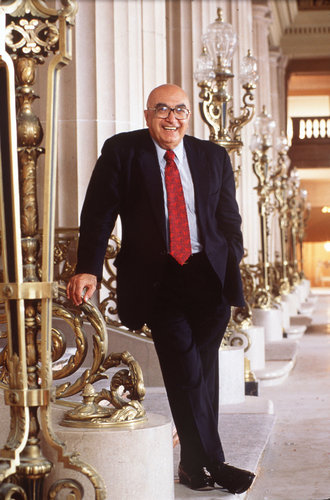
September 06-13
Lotfollah “Lotfi” Mansouri, who left Iran to study psychology in the United States and rose to be one of the major figures in the global opera scene, died at his home in San Francisco Friday. He was 84.
Mansouri headed up the Canadian Opera Company in Toronto for 12 years and then the San Francisco Opera for 13 years.
He had a populist streak that massively expanded both companies’ reach. He said his goal was to make opera a popular art form and not an esoteric one. His best-known innovation was to add English translations above the stage.
Mansouri died suddenly after a battle with pancreatic cancer, the Canadian Opera Company said in a statement Saturday.
“Lotfi’s greatest gift was a fundamental belief that opera was for everybody,” said Dory Vanderhoof, who worked alongside Mansouri as a senior manager at the company for 10 years.
Most importantly, while at the Canadian Opera Company, Mansouri invented surtitles, the practice of projecting lyrics in the audience’s native language onto screens flanking the stage so that viewers could understand performances often sung in German or Italian.
Opera houses around the world were quick to follow suit, and the technology is now ubiquitous. “Surtitles put the company on the map,” Margaret Genovese, who worked under Mansouri in Toronto for a decade, told the Toronto Star.
“The introduction of surtitles just completely changed the industry. It was like night and day,” she said. Before surtitles, “People used to sit in performances with pen lights.”
When Mansouri introduced the surtitle in January 1983, it was controversial. Traditionalists criticized the new technology, calling it a distraction from the music and a marketing gimmick.
But Beverly Sills, who ran the New York City Opera at the time, quickly introduced a similar titling system at the New York State Theater in September of that year.
Today, surtitles or other forms of synchronous translation are used in many of the world’s most prestigious houses. In 1995, the Metropolitan Opera in New York introduced Met Titles, a system of screens mounted on seat backs that can be turned on or off, as the audience member prefers.
In the 1960s, before his fame in Toronto and San Francisco, he lived in Switzerland, where he served as stage director at the opera houses in Zurich and Geneva.
In Toronto from 1976 to 1988, he expanded the company’s subscription base and made opera more accessible to a general audience, former colleagues said.
“He came to Toronto and blew away all the stereotypes about opera,” said Vanderhoof. “If you go back to the logo of that time, the COC had stars and exclamation points in its name, which made opera seem fun instead of like an elite organization.”
John Leberg, director of operations at the company under Mansouri, remembers the first time the opera house employed surtitles, for a performance of Elektra by Richard Strauss.
“The question that Lotfi put to me was ‘How can we make the text clear to the audience?’” Leberg said. “It was because Lotfi wanted to make opera accessible to everyone. He had a passion for that.”
Born in Tehran June 15, 1929, Mansouri went to Los Angeles as an undergraduate student at UCLA in 1948, according to his 2010 memoir Lotfi Mansouri: An Operatic Journey. The future opera impresario began his career as a vocalist, singing duets with Carol Burnett, including one performance at a rally for Congressman Richard Nixon.
Leaving Toronto in 1988, Mansouri took the reins of the San Francisco Opera, where he remained until retirement in 2001.
In San Francisco, Mansouri led the company in commissioning several new works that addressed modern and American themes, taking opera out of mothballed European history. These included Stewart Wallace’s Harvey Milk (1996), AndrÈ Previn’s A Streetcar Named Desire (Fall 1998), and Jake Heggie’s Dead Man Walking (Fall 2000). This move has helped build the house’s reputation as one of the leading innovators in the United States, a reputation that is still held today.
Friends remembered Mansouri as a “charismatic” and urbane man who spoke fluent French, Italian, German and Russian as well as Persian and English.
Leberg spent time with Mansouri last Saturday, six days before his death, when the ailing opera giant wanted to demonstrate how had he staged the musical Show Boat in a variety of languages, “whereupon he sang ‘Old Man River’ in German.”
Mansouri refused to stage plays that were prohibitively expensive, or dense and inaccessible, Vanderhoof said. “He truly believed it was show business and you had to keep the people coming.”
By the time Mansouri left for San Francisco, the Toronto company had 20,000 subscribers who bought 140,000 opera tickets a year, Vanderhoof said.
Genovese said, “He was brought to Canada to make the company international, and he certainly succeeded.”
Mansouri is survived by his wife, the former Marjorie Anne Thompson, and their daughter, Dr. Shireen Mansouri.
Mansouri weighed into the political world in 1989, when the United States Senate passed a bill sponsored by Senator Jesse Helms, Republican of North Carolina, to bar the National Endowment for the Arts from using federal money to “promote, disseminate or produce obscene or indecent materials,” including “sadomasochism, homoeroticism” and the exploitation of children.
Mansouri wrote an opinion article for The New York Times that argued several of the most venerable operas, including “Die Walkure” by Wagner and “Salome” by Strauss, could be banned under Helms’ restrictions.
“It is the responsibility of an international opera company to present the full spectrum of opera in all its diversity,” he wrote. “That spectrum would be severely curtailed if we allow politicians like Senator Jesse Helms to decide which works we may present.”





















